Better Homes And Gardens Led Lights

If you've had any kind of success with growing your own food in a garden or patio area, then you know how enjoyable it is to harvest some vegetables, strawberries, or even just some fresh herbs.
But when winter sets in, you either need specialized equipment, or you could try your luck with indoor gardens.
The best thing is that growing plants in this way doesn't even require a green thumb. These indoor garden systems make it almost full proof.
Let me show you some great choices.
My Top 3 Picks for Best Indoor Garden Systems in 2021
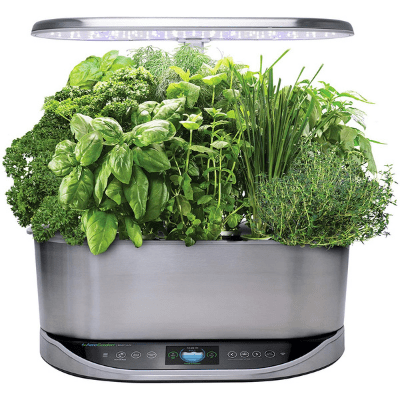
AeroGarden Bounty Elite
- Integrates with Alexa
- LED lights produce thicker plants
- Grow up to 9 plants
- Selection of seeds included
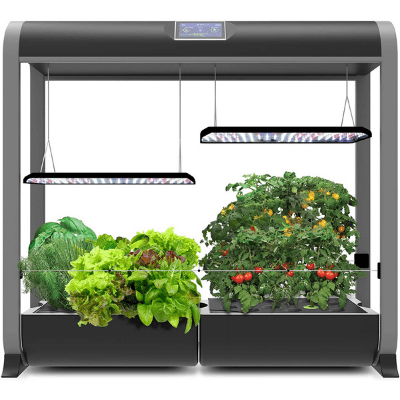
AeroGarden Farm 24Plus
- Grow up to 24 plants
- Height-adjustable LED lights
- Adjustable watering settings
- Ideal for taller plants
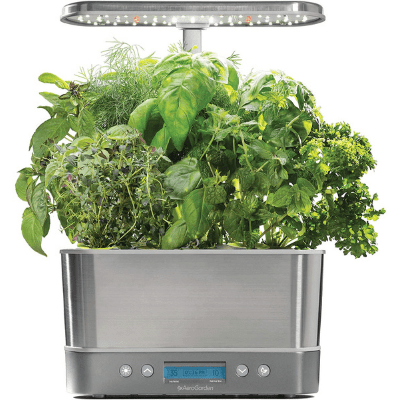
AeroGarden Harvest Elite
- Great value for money
- Compact design
- Includes seeds and plant food
- Easy to use for beginners
10 Best Indoor Garden Systems To Start Smart Gardening
1. AeroGarden Bounty Elite (Best For Smart Home Integration)
This was the second smart garden I bought, and it's still by far the easiest one to use. It has a self-watering system where you simply fill it with water and plant food and then check every few days if you need to top it up.
The built-in led lights can be set on a simple timer, and you can adjust them depending on the day. So, if you have a nice sunny day, then it's easy to reduce the energy output by dimming the grow lights.
I have also found that growing plants requires hardly any supervision, and I've filled it with cherry tomatoes that almost grew as fast as in summer.
Just keep in mind that if you're growing herbs that the maximum height of the grow lights might not suit some taller plants.

Pros
- Can grow nine plants at a time
- Integrates with Alexa
- Easy to program the LED grow light
- Stainless steel finish
- LED light encourages fast and thick plant growth
Cons
- It would be great if the grow lights adjusted a bit higher
Why Do I Like It?
The main reason I would recommend this is that you don't need to be a master gardener to get fresh food in the winter months.
2. AeroGarden Farm 24Plus (Best Tower Garden)
This is probably the Cadillac when it comes to indoor gardens. Not only does it have an automated self-watering system, but it also allows you to control the two sides of it for optimum watering and nutrient delivery to the plant's roots.
As a result, you'll have healthy plants no matter what their nutrient requirements are.
You can also grow up to 24 plants, all under two sets of grow lights that you can individually adjust for optimum height. And you receive seed pods that are ready to sow and get you started as soon as it arrives.
Now, it is expensive, but given the number of plants you can grow, this will quickly pay off.

Pros
- Excellent adjustments for the grow lights for a vertical garden
- Allows you plant up to 24 different plants
- Set up different controls for water and plant food
- Two separate growing sections
- Comes with a great selection of seed pods
Why Do I Like It?
This device makes indoor gardening a lot more flexible as you have more control over the watering and nutrient delivery system.
3. AeroGarden Harvest Elite (Best For Lower Budgets)
This is one of the most affordable smart garden kits I have been able to find, and I like that it's low maintenance with some simple automation settings. The display will tell you when to top up with water and plant food, and you can even automate it for when you're on vacation.
The seed starting kit gives you six herbs and vegetables that will grow indoors within a few months.
Right out of the box, it has everything you need to grow your first plants, including plant food. And because it's such a small system, it should fit onto any kitchen counter without taking up too much space.
I like that it comes with full-spectrum LED lights, but at 20 Watts, those lights might not be strong enough.

Pros
- Small design allows for six plants to grow at the same time
- Easy to read digital displays includes a vacation mode for the hydroponic system
- Plant food is included for the first season of growing
- Comes with a selection of gourmet seed pods to get you started immediately
Cons
- 20 Watt LED grow lights might not be strong enough for some crops
Why Do I Like It?
It's very affordable and provides a hydroponic system that doesn't require any prior expertise to get started.
4. Miracle-Gro Twelve Indoor Growing System (Best Decorating Your Home)
This is one of the more unique indoor gardens as it's designed to look like a small side or end table. That means you could buy a few of these and place them in your dining and living room for some added color and even smells.
It includes the seeds and nutrient kit so that you can start planting immediately. And self-watering hydroponics means that you just need to keep an eye on the water level.
You can fully control the light settings to suit the indoor growing environment, and it works great even in a small space.
You can expect to see lettuce grow within weeks, and I've used it for tomatoes and curly parsley as well. Just keep in mind that each system has room for only four plants in the water tank.
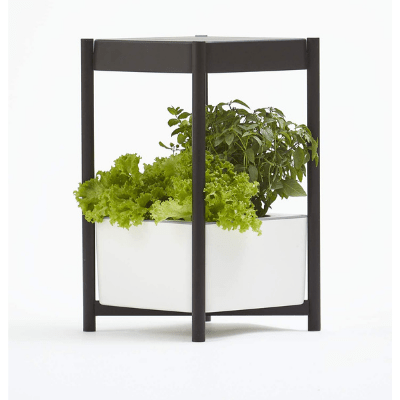
Pros
- Designed to look like a side table
- Comes with seeds and food
- Integrates with a smartphone app to give you maximum control
- Ideal for growing plenty of plants in your living space
Cons
- You're limited to growing 4 plants at the same time
Why Do I Like It?
I love this rise garden because it looks like a side table that you could place in your Kitchen, dining, or living room.
5. iDOO 12Pods Hydroponics Growing System (Best Different Light Modes)
The one thing that stands out the most about this indoor gardening kit is that you can adjust the color settings of the LEDs to a growing system that suits your plants.
You can simply adjust it for herbs, leafy greens, or vegetables as needed to maximize growth.
The large tank also makes it easy to keep nutrient levels topped up without having to monitor it on a daily basis.
It also comes with everything needed for germination so that your first attempt to grow indoors doesn't fall apart at the early stages. I must say, I'm a fan of the germination kit that comes along.
The only downside is the maximum height above the water tank, which could limit some herbs and other plants.
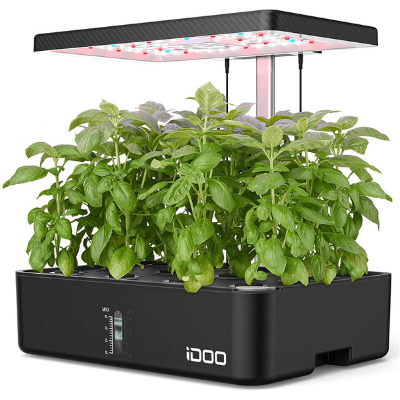
Pros
- Allows for growing 12 different plants at the same time
- Built-in germination kit
- Set the 22-Watt LED grow lights automatically
- Different color light settings
- Large self-watering tank
Cons
- The LED height setting is limited to just over 11 inches
Why Do I Like It?
Having the option of different light modes means that you can change it depending on whether you're growing basil pods, curly parsley, or other vegetables.
6. Rise Gardens Personal Garden and Starter Kit (Best Space Saving Design)
Rise Gardens has created a very elegant starter kit for indoor growing. The frame of it looks great, and it has a rectangular shape that makes it easier to place up against a wall and not take up too much space.
You also have a lot of control over the self-watering system through an app integration so that you can adjust it to the types of plants.
You also receive a selection of seeds for fresh herbs and greens, or you could simply pick your own seeds to give you the crops you're most likely to add to your meals.
One of the biggest advantage of having indoor garden systems is that you can grow a wide of plants in a compact space. And, this particular indoor garden system does the job immaculately.
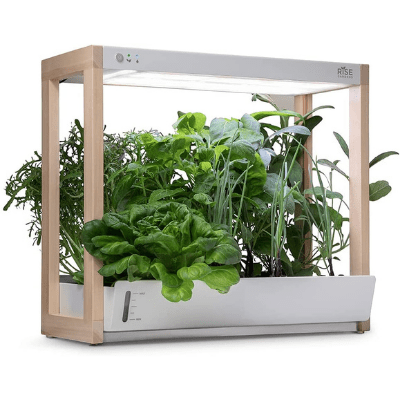
Pros
- Great looking indoor growing system to provide visual impact
- Integrates with the Rise Gardens app to control all the settings remotely
- Comes with a great selection of seed pods
- Sleek design philosophy
Cons
- No height adjustment for the lighting system
Why Do I Like It?
Rise Gardens has a unique design that looks great and gives you a lot more flexibility where you place it without taking up too much space.
7. Back to the Roots Organic Mini Mushroom Grow Kit (Best Mushroom Growing Kit)
For the simplest and cheapest solution to creating indoor gardens, Back to the Roots has the ultimate solution. Everything comes in the box ready to go, and all you need to do is cut open the front of the box.
You then add water and wait for the oyster mushrooms to germinate within a few days. What's even more amazing is that you'll have your first crop ready to go in 10 days.
You could even stock up on these and then use them in the summer months outdoors, where you just need to make sure they have shelter and regular water.
The main downside is that you can't grow more plants in this system, but when you consider the price, it's really not something you would expect.
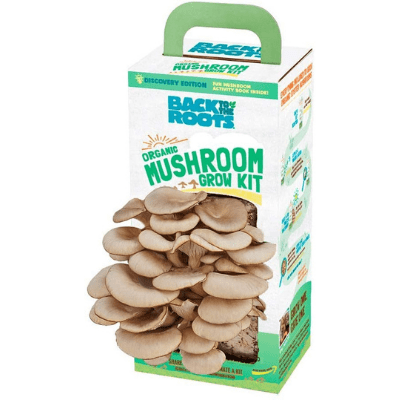
Pros
- Fastest and easiest way to start growing mushrooms in your kitchen
- Requires only regular watering to start harvesting within 10 days
- Suitable for outdoor and indoor use
Cons
- Just a mushroom growing kit, not a complete indoor garden system
Why Do I Like It?
It really doesn't get any cheaper and easier to start growing and harvesting oyster mushrooms in your own home.
8. Click & Grow Indoor Herb Garden Kit with Grow Light (Best Self-Watering System)
The Click and Grow smart garden is ready to go straight out of the box, and you don't need a green thumb to keep your Thai basil or flowers alive. Just keep it topped up with water and fertilizer, and the system takes care of everything else.
The LED lights are ideal for herbs and small flowers to brighten up the winter months, but you'll also have success with vegetables like lettuce and tomatoes.
The Click and Grow smart garden has seed pods that are ready to go when they arrive, and you could have some Genovese basil within a couple of weeks.
What I would point out, though, is that you can only add three plants at a time, and you need to avoid those that grow quite tall.
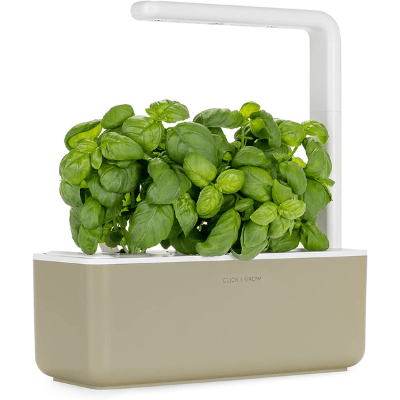
Pros
- Self-watering system
- Ability to choose from 50 different seed pods
- Small design makes this ideal for a windowsill even in small apartments
- LED grow lights provide a great growing environment for a fast harvest
- Comes with three basil pods included
Cons
- You're limited to growing three smaller plants
Why Do I Like It?
One of the best self-watering indoor garden systems — it has a compact design that fits on a windowsill even in small apartments with limited space.
9. Chef'n Microgreens MicroGreens Grower (Best For Microgreens)
I have this year-round on my kitchen windowsill as it's the ideal solution for the herbs that I use on a daily basis. But I've tried it to watch lettuce grow, and the results have been surprisingly good.
It's a simple gardening system with no automation, which does make it one of the eco-friendliest. It also means that you do need to keep an eye on the soil moisture and set a reminder to add nutrients.
The company also offers an easy ordering system to receive more seeds so that you can keep growing vegetables indoors throughout the winter.
Just keep in mind that it's not an ideal system if you need to place it where it won't get much sunlight because there are no LEDs included.
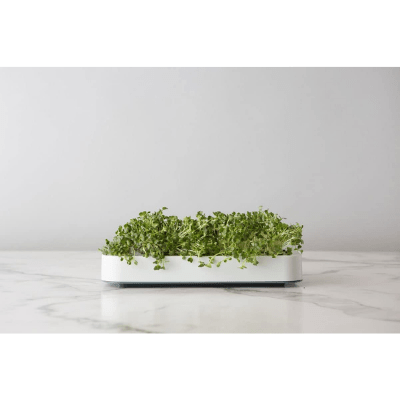
Pros
- Works great for smaller leafy greens and herbs
- Some of the plants are ready to use within 10 days
- Just add water every few days and nutrients every couple of weeks
- You can easily order seeds from the company to keep your crops growing
Cons
- It doesn't include a grow light system
Why Do I Like It?
It's a really simple tray system that I use for growing a few herbs like basil to have easy access when preparing meals.
10. Hydrofarm MGSYS Hydroponic System (Best For Easy Expansion)
The final recommendation I have is this Hydrofarm one that is suitable for use both indoors and outdoors, so you could just transfer it to your garden in the spring. I also like that you can easily move around the small pots so that you can replace plants and give them better light.
The box arrives with soil and nutrients ready to go, so all you need to do is sow the seeds and watch them sprout.
Within a few weeks, you'll see lettuce grow, and herbs will flourish just as easily. What's great is that there's an automated pump system that makes sure that your indoor garden plants have the right moisture and nutrients.
What you do have to consider is that it's not the prettiest garden system, but it's an effective solution.
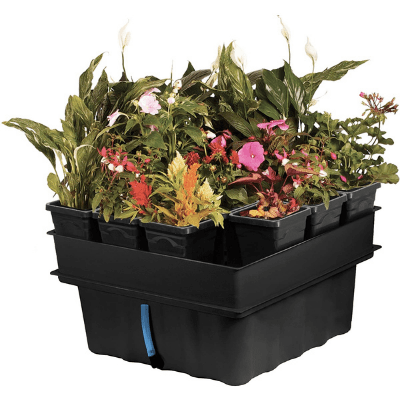
Pros
- Convenient system design allows you to add more containers as needed
- Easy to bring outdoors in springtime to prepare seedlings
- Includes soil material with the ideal mix of nutrients
- The submersible water pump has an automatic timer for optimum irrigation
Cons
- It doesn't look as fancy, but it's an effective solution
- Doesn't have any LED grow light
Why Do I Like It?
It's the best indoor system to add and remove individual plants and rearrange those that are growing faster.

Indoor Gardening System Buyers' Guide
Before you make your final decision on an indoor gardening kit, take a look at this advice that should help you come to a better choice.
Why Should You Start An Indoor Garden?
If you love spending as much time as you can in an outdoor space like your garden or patio, then the winter months can be quite challenging. And if you're also into traditional gardening where you get your hand dirty, then there's often not that much you can do.
For me, the most frustrating thing was that one of the great family activities of growing our own food was gone.
And we certainly noticed that we were spending a lot more at the grocery store, even with preserving a lot of our fall harvest.
If that all sounds familiar, then you have a couple of really good reasons to invest in our best indoor garden recommendations.
It's a great way to keep your gardening skills active in winter, and you can even learn a lot of new tricks.
More importantly, though, you'll be growing your own food where you know exactly how organic it is. And you can always harvest it straight to your plate for the most delicious food possible.

Are The Smart Garden Systems Eco-Friendly?
The answer to this depends on a few specifications of your smart garden system. As you can see above, the ones I've had the best results with have grow light systems.
You can get them without such lights, but then you'll be limiting your results for pretty much every type of plant.
But these don't have to be a problem.
Check For The Right Bulbs
All the above systems come with extremely energy-efficient LED bulbs. And because they emit just the right type of light waves, you can get the maximum effect that mimics sunlight.
And because they have timers, you won't end up wasting tons of electricity. You could even take it one step further and invest in a small solar panel and rechargeable battery system to lower the electricity usage even more.
Compare Carbon Footprints
What you can do with these smart garden systems then is calculate how much electricity they will use on a typical day. You then multiply that by the number of days from seed to harvest, and you have calculated a rough carbon footprint.
Of course, each plant will also absorb CO2, but let's not complicate it too much.
What you should do, though, is compare that carbon footprint to the environmental impact of driving to a store and factoring in the supply chain of the food industry. I'm 100% certain that even with the LEDs, it will be a more efficient way to grow indoors.

Understanding The Four Types Of Indoor Garden System
When it comes to setting up an indoor garden, you have four systems to choose from.
Soil-Based Systems
These are small containers like garden pots that you can stand in a larger container or tray. Water and fertilizer are pumped around the system, or they can be even more basic where you need to manually water the soil.
Hydroponic Systems
These are based on a carefully formulated nutrient-rich solution that circulates through the system. The water is constantly pumped through and replenished with fertilizer for the roots to absorb directly.
Aquaponic Systems
These are very innovative solutions where you have a separate fish tank. They provide the waste that serves as a fertilizer full of nutrients. The rest of the system works the same as the hydroponic one.
Aeroponic Systems
These are one step up and highly advanced systems that use moisture and water vapor to spray onto the roots of plants. Essentially, the roots are exposed and take on the fertilizer directly from the vapor.
The easiest ones to get started with and requiring the least amount of effort are the soil-based and hydroponic systems. The rest all require advanced skills, and I haven't included them in my list of best indoor kits above.

What Is The Ideal Size For An Indoor Garden System?
The first thing I would say is that you shouldn't try to plan and get everything you need to survive from indoor gardening. Even if you have a large home, you'll end up spending a lot of money on these systems.
There are probably better ways to do that level of growth with a winter garden or greenhouse.
But for growing herbs, a few leafy vegetables, and even some flowers, I would say that starting with a system that can accommodate nine plants is ideal.
They won't take up much space at all, and there will be enough room for each plant to flourish.
With a bigger budget, you could get a 24-plant system that really would be a small garden patch in your home.
Another option is to buy one or more of the end table designs. You can place these around your home, and they can serve as plant decorations as well.
Ultimately, start with something that you can manage, and then expand as you understand the different growing techniques and timing better.

Watering and Lighting Systems: What Should You know?
If you want to avoid messing up the watering and lighting for your crops, then I would suggest investing in one of the best indoor gardens that include automated systems.
Here's why they are important.
Automated Watering
In hydroponic systems, the roots are constantly exposed to a water and fertilizer solution that circulates. But in soil-based systems, it's even more important to have some sort of a pump feature.
Using the pump will ensure that the soil stays moist so that the plants will thrive. This is especially important in these smaller pots as the soil will dry out a lot faster than what you might be used to for outdoor gardening.
With the hydroponic systems, it's important to look for some sort of a water level indicator as well. Those with smart features will even send you a reminder to keep them topped up with water and fertilizer.
Smart Garden Lighting
If you're lucky enough to get bright and sunny days in winter, then automated LEDs won't be essential. But you're still limited to the number of daylight hours.
That's why an energy-efficient LED system is an ideal solution. These emit the same color spectrum as the sun to encourage more plant growth even if you're hedging into dull days where plants will almost go dormant.

The Pros and Cons of an Indoor Garden System
The main reason I invested in a smart garden is to keep a small supply of vegetables going in winter. And I could enjoy a hobby with my kids even when our outdoor space no longer supported growing vegetables.
It's also great that you really don't need any skills, as the automated features will create the optimum growing environment. I've managed to grow herbs and lettuce within a few weeks, and you can keep that supply going all winter.
The main downside is that if you want to grow larger volumes to feed your family, then it will become quite expensive.
Pros
- Easy to use systems that require no gardening skills
- Keep feeding your family homegrown products all-year-round
- Ideal for leafy vegetables and herbs
- Fully automated systems
- ensure that your crops never run dry or out of fertilizer
- Takes less space and ideal for apartment homes
- Great way to beautify your home
Cons
- Some of the advanced smart systems can be quite expensive
- Even the larger systems will give you a limited harvest
Final Thoughts
I highly recommend that you look at the best indoor garden systems above and would suggest investing in the AeroGarden Bounty Elite. It makes indoor gardening so easy and will allow you to expand to growing more than just a couple of plants.
It's a fun way for your family to keep a grow-it-yourself tradition going. And even if they use up some electricity, goring your own crops has a far lower carbon footprint than anything you'll find at a market or store.
Better Homes And Gardens Led Lights
Source: https://greencitizen.com/indoor-garden-systems/
Posted by: richardwhichosedn.blogspot.com

0 Response to "Better Homes And Gardens Led Lights"
Post a Comment